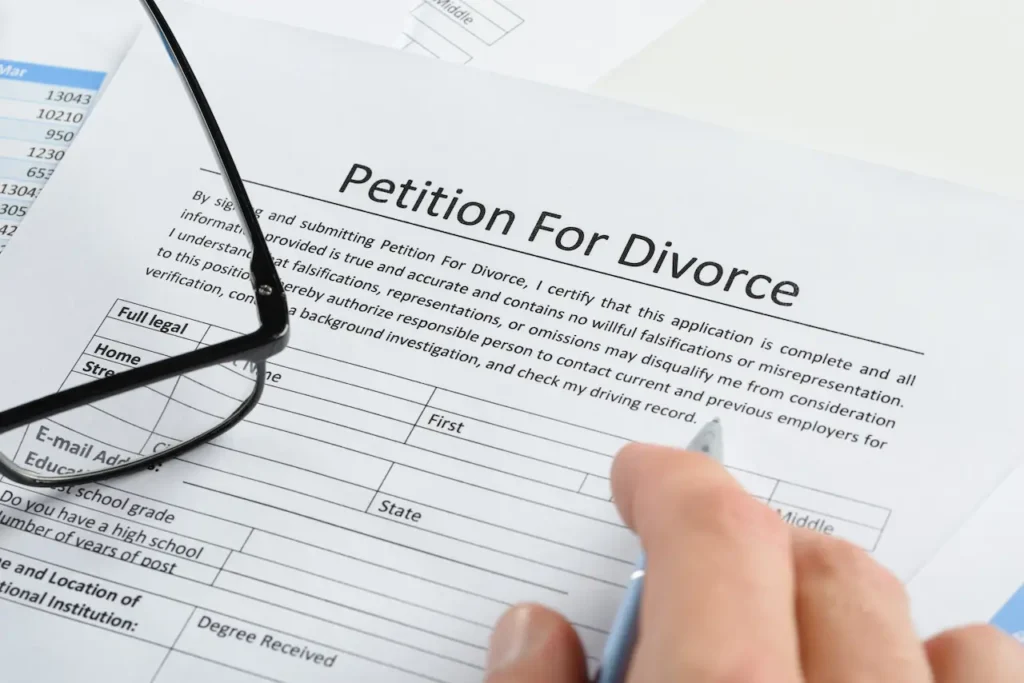Key Takeaways
Legal separation in Massachusetts:
- Lets couples tackle support, custody, and visitation while staying married.
- Keeps marital benefits like insurance and joint tax filing.
- May lead to reconciliation (roughly 10 to 20% of separated couples reconcile).
- Uses a court process starting with a Complaint for Separate Support under Massachusetts General Laws Chapter 209 Section 32.
- Includes filing, serving the spouse, and a hearing within 4 to 8 weeks.
- Doesn’t divide property or dissolve the marriage.
Legal separation in Massachusetts is called “separate support” and is a court process that lets married couples live apart while resolving issues like financial support and child custody, without ending the marriage.
Legal separation can be a good choice for couples who object to divorce for religious reasons, want to retain health insurance or other marital benefits, or are considering reconciliation. It lets spouses protect themselves legally while remaining married.
However, filing for legal separation without the help of an experienced attorney may mean missed financial rights or custody arrangements that don’t work as well as they could. An experienced Worcester family law attorney can help ensure you understand and assert your rights.
Get in touch with us to schedule a free consultation and to learn more about legal separation in Massachusetts.

What Are the Key Differences Between Legal Separation and Divorce in Massachusetts?
The biggest difference between legal separation and divorce in Massachusetts is that legal separation keeps you legally married, while divorce ends the marriage and divides property.
However, there are others to understand.
- 1. Separate support resolves temporary issues like child custody and financial support.
- 2. Divorce addresses everything permanently, including asset division and alimony.
- 3. Divorce also includes a 90 to 120 day “nisi” period before becoming final.
Here’s a quick comparison:
| Feature | Legal Separation (Separate Support) | Divorce |
| Marital Status | Married | Legally ended |
| Property Division | No | Yes |
| Custody/Support | Yes | Yes |
| Insurance Access | Maintained | Usually lost |
| Reconciliation | Easier | Requires remarriage |
Because the differences can be pretty subtle, so it’s important to work with an experienced family law professional rather than rely on general information alone.

How Does Legal Separation Affect Marital Status and Remarriage?
Your parenting plan should include a detailed parenting time schedule, holiday/vacation schedule, information about who can make decisions regarding the child, details abouLegal separation doesn’t affect your marital status; you remain married and cannot remarry.
This allows couples to keep benefits tied to marriage, like tax filing status or healthcare access, and may also connect with with religious beliefs. Around 10 to 20% of couples who separate reconcile, often within just 6 to 12 months.
Legal separation creates space for that possibility without requiring a new marriage process. However, assuming verbal agreements or informal separations will hold up in court can lead to major disputes. It’s crucial to formalize arrangements through the Massachusetts Probate and Family Court.
What Are the Grounds Required for Legal Separation in Massachusetts?
The grounds required for legal separation in Massachusetts include showing a “justifiable cause,” like desertion, abuse, adultery, or failure to provide support.
The court can interpret these grounds pretty broadly. For example, a spouse who moves out and cuts off financial support for 3 to 6 months may meet the requirement. Additionally, abuse can include emotional or financial abuse, not just physical harm.
While fault isn’t required as in older divorce laws, you do still need to provide sufficient evidence to meet the threshold. Working with an attorney can help ensure your Complaint for Separate Support includes all the required documentation.
Learn more about the divorce process in Massachusetts if you’re weighing both options.
Can You File for Legal Separation Without Living Apart?
Yes, you can file for legal separation in Massachusetts without living apart, as long as you have a justifiable cause.
For instance, if living together means that you’re dealing with safety concerns or financial harm, the court can still grant support and custody orders. That said, most legal separation cases involve spouses who are already physically separated or planning to separate.
Being apart for 1 to 3 months can help support your claim. Courts evaluate living situations carefully, and moving forward without a lawyer may mean that you have weak evidence or delayed financial relief (support payments from your spouse).
How Does the Legal Separation Process Work in Massachusetts?
The legal separation process in Massachusetts starts with filing a Complaint for Separate Support in the Probate and Family Court, paying the filing fee, serving your spouse, and attending the hearing, as well as getting temporary support/custody orders.
Steps include:
- File the complaint and pay filing fees ($100 to $200, usually).
- Serve your spouse with a court summons.
- Attend a hearing usually scheduled 4 to 8 weeks after filing.
- Receive temporary orders for support or custody, often early in the process.
There’s no formal waiting period, unlike divorce. Mistakes in filing or serving can be problematic, though, and will delay the process or could mean a dismissal.
A lawyer can ensure compliance with Massachusetts General Laws Chapter 209 Section 32 and avoid common pitfalls. You can also explore related support mechanisms like temporary orders in family law.

What Forms and Documents Are Needed to File for Legal Separation?
If parents can’t agree on a parenting plan, To file for legal separation, you’ll need some important forms and documents: a Complaint for Separate Support, a financial statement, and an affidavit explaining the grounds for separation.
Most courts require 2 to 4 copies of each form. Supporting documents like income verification, bank records, or evidence of abuse may strengthen your case. A complete filing usually ranges from 5 to 10 pages, but more complex cases may require more. Note that incomplete forms are a common reason for rejection, so legal review is recommended.
What Happens During a Legal Separation Hearing?
During a legal separation hearing, the judge reviews your grounds and may issue orders for spousal or child support and custody.
Hearings usually last 1 to 2 hours. If both parties agree on key issues, the process can move quickly. In contested cases, both sides can present evidence and witness testimony. Hearings deal with sensitive (potentially traumatic) information. Working with an experienced attorney can help reduce your stress.
What Are the Benefits of Choosing Legal Separation Over Divorce in Massachusetts?
Legal separation lets you keep financial and legal benefits while living apart.
For example:
- You can still file taxes jointly, which can save $500 to $2,000 annually depending on income.
- Health insurance coverage typically remains intact, and Social Security benefits after 10+ years of marriage are preserved.
- Some couples use legal separation to create a 6-to-12-month reconciliation period.
For families with children, separation can provide a stable environment without the upheaval of a full divorce. However, each case is unique, so always consult an attorney.
You may also want to explore annulment vs divorce in Massachusetts for other alternatives.

How Does Legal Separation Impact Health Insurance and Other Benefits?
Legal separation doesn’t have to impact health insurance or other benefits, at least not right away.
You should be able to access to health insurance, particularly under COBRA-like rules or for military spouses married 10+ years.
Coverage often remains in place until a divorce is finalized. Under federal COBRA rules, continuation typically lasts 18 to 36 months. Massachusetts state employees may also keep their GIC benefits during separation. Double-check your policy and employment contract for the specifics. However, it’s also important to note that without legal oversight, coverage gaps are common, so work with an experienced family law attorney.
What Financial Advantages Does Legal Separation Offer in Massachusetts?
Legal separation lets couples file taxes jointly, possibly saving you $500 to $2,000 per year, and lets you skip immediate asset division (although that will come later if you proceed with the divorce).
It also gives you temporary spousal support without committing to long-term alimony terms. That can give spouses time to prepare or decide on divorce without rushing major decisions. However, prolonged separation without property agreements can complicate future divisions. Get legal help to maximize short-term benefits while planning for long-term needs.
What Role Does Child Custody and Support Play in Legal Separation?
Child custody and support are based on the child’s best interest during legal separation, just like in divorce.
Courts may order shared or sole custody, depending on living situations and parental involvement. Parenting plans will outline how you’ll handle visitation and holidays.
Support is calculated using Massachusetts guidelines (usually 20 to 35% of the noncustodial parent’s income). These are temporary and can be changed if you divorce later. Trying to negotiate these terms yourself rarely works out for the best and can create “unfair and unequal” outcomes.
Professional support gives you child-focused, legally sound agreements. Learn more about child custody in Massachusetts.
How Is Child Support Calculated During Legal Separation?
Child support is calculated using the Massachusetts Child Support Guidelines, usually 20 to 30% of the noncustodial parent’s income for one child.
Adjustments may apply for shared custody (50-50 arrangements can reduce payments by 10 to 20%). Judges may also consider health insurance premiums, daycare costs, and existing support orders. If your income or custody arrangement changes, you can request a modification.
Working with an experienced attorney helps prevent errors and makes sure you comply with state guidelines.
What Are Common Challenges and Risks in Legal Separation?
Legal separation carries challenges and risks like unenforced court orders, emotional strain, and future disputes over growing assets.
- If a spouse ignores a court order, enforcement can mean going through additional hearings or contempt actions.
- Without property division, assets may grow 5 to 10% annually, leading to later disputes.
- Emotionally, separation lacks the closure divorce can provide. If you’re looking for a clean break, a divorce may be the better option.
- DIY filings often miss key protections.
Learn about divorce mistakes to avoid in Massachusetts and consult a lawyer to avoid similar pitfalls in separation.
Frequently Asked Questions
Can legal separation in Massachusetts be converted to divorce later without starting over?
Yes, a separate support case can lead to a divorce, but you’ll need to file a new Complaint for Divorce to formally end the marriage.
Does legal separation affect immigration status for non-citizen spouses in Massachusetts?
It can. Immigration authorities may scrutinize separate living arrangements. Legal advice is crucial to understand individual risks.
What if my spouse refuses to cooperate during the separate support process?
The court can still issue orders after proper service, even if your spouse doesn’t participate.
How does legal separation impact eligibility for survivor benefits like pensions?
If you’re still legally married, you’re often eligible for survivor benefits. Always check the plan’s specific terms.
Is there a minimum time requirement for separation before filing for support in MA?
No. You can file as soon as a justifiable cause exists, even without physical separation.s.

Michelle Murray has devoted her practice exclusively to family law matters, focusing her efforts on assisting clients through divorce, custody, property division, child support, spousal support, and visitation issues throughout Worcester County.
